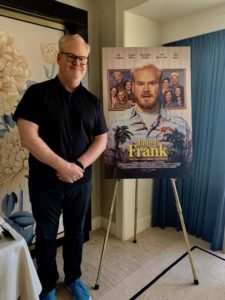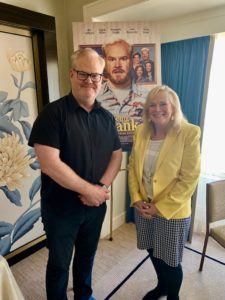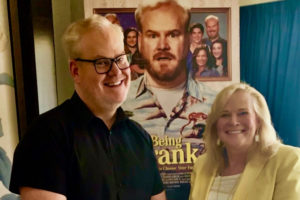Jim Gaffigan gets candid about his role in “Being Frank,” his college football days, his family vacations, doing standup in our ‘politically correct’ culture world, and more.

Jim Gaffigan, (Frank) and Logan Miller, (Phillip) play father and son in the movie “Being Frank,” directed by Miranda Bailey. It’s the story of a dad who is living a lie by being married to two women of which he has children with each. The setting of the 90s helps to maintain the lie, due to no social media to call him out, although Phillip uncovers the truth early in the film and it’s off to the races. Gaffigan talked about his real-life role as a dad; lessons learned from being an actor and standup comedian, his days as a college football player, his comedic role models, and watching movies with his kids. Our interview took place at the beautiful Peninsula Hotel in Chicago on July 10, 2019. To my delight, I even made Jim Gaffigan laugh out loud!

Sarah Knight Adamson: What did you like most about playing this part?
Jim Gaffigan” Oh my gosh. I guess I liked playing a dad who eventually bonds with the son. That, you know, figured out a way to communicate with his kid. I think every parent wants that. But I believe that he really, as a result of a horrible thing, he develops a certain relationship with his son that he might not have had before.
So Frank appears to have the opposite moral compass as you have in your own life. What parts of your fatherhood did you draw on for the role?
JG: There’s a different parenting approach you have with every child and I kind of justified Frank’s different approach in the different families, we learn because of who he is, that’s why he does the different parenting styles. I have different sides of me that are obviously as a result of being married to my wife; I’m much more of this type of parent than that type of parent. But I could see myself in a lot of those different philosophies that either parent embraced.

One aspect of the film that it brought out for me is for kids of divorce, and perhaps the notion of their dad’s new family and the possibility that he treats them differently, which I know can be a common thing, than the first family. It’s not necessarily a lie, but the reason that many of the emotions are still there. So I felt like families could pick that out as well. I certainly picked it out.
JG: I think that’s what drew Miranda to this project. Her father didn’t have a second secret family, but I think, I can’t speak for her, but I think that there was something of that like the new second family doesn’t have to be hidden, but the same kind of wounds or questions come up.
I liked the script too, because there are so many shocking moments, especially when you tell your son what you’re going to do if he reveals the lie. And I thought, maybe that’s a lie too, but still, Phillip believes it.
JG: I think we all have lies because I remember thinking about that and thinking, “Well, if that ever came to that I would just do that.” Maybe they haven’t articulated it, but they’ve had that kind of, you know, ridiculous solution.
Under Miranda Bailey’s direction, were you able to improvise any scenes?
JG: There was some improvising, as Logan is also a really funny guy. So you know, hanging around him there would be some humorous moments here and there that we would insert. But, you know, you also want to serve the story. You want to respect what they’re trying to; what the story is trying to do.
In today’s environment of fear of offending, and I know that Jerry Seinfeld said that he’s really finished with the PC culture, you know, the politically correct and performing college campuses. So how do you gauge in your own comedy routine as to what is appropriate or what isn’t?
JG: Well it does change, you know, comedy, or liberty, they kind of change every decade. So it’s adjusting to that. But I also don’t worry because the target is usually myself. That being said, you know, language, we’re, comedians, we’re writers. So it’s like, I would never be for censorship anyway, but I also kind of feel like it’s not, for me, it’s not that hard to change a word if it insults people. Do you know what I mean? And I think that even if we looked at standup from 1970, we’ve changed a lot. And during that time, you know, we weren’t supposedly in the throes of a PC culture. But I also feel as though I am a straight white male and there’s a little bit of like, all right. Am I the enemy?
My husband played college football at the University of Arizona, and he has said at rough times in business it had helped him. And I know you played at Purdue and Georgetown, did those days help you.
JG: You know I walked on to Purdue.
Well, I also know that’s even harder to do! (Jim smiles)
JG: I mean, yes, sports were, I think so important. I guess maybe the discipline of following a coach’s orders. It’s kind of invaluable. But I also think that I’m grateful for it. And some of it is like, I look at my sons, and I want them to have it. But you can’t make a kid want something if they don’t want it. But I also feel as though so much of life that I’ve learned is through standup, too. And also acting, it’s like the reason I do it, you’re thrust into having a self-awareness pretty quickly when you’re an actor. There are plenty of times when I’ve auditioned for something, and the character is not so cool. They’re like, “Yeah, the fat tubby ugly guy.” And you’re like, “Am I auditioning for this? Do I want this?” So it’s like you have to develop some calluses and some awareness. Similar to football, it’s like my elbow hurts, but I’m playing because I don’t want to turn to these 10 or 11 guys and say, “My elbow hurts.”
Exactly. And that can really hurt. So who are some of your comedic role models when you were starting? I know you mentioned a few Richard Pryor was one.
JG: Well, there are the greats. I think Letterman was a huge influence being from Indiana. And also, he went through different stages, but I think he was also that Midwestern sarcasm but civility. I loved Louis Anderson, but Carlin was a fantastic writer as well as Seinfeld, his efficiency, and the joke writing is huge. Wait, there’s Jonathan Winters a huge influence on me, and yeah, I remember being a kid watching Phyllis Diller and thinking this woman’s amazing.
I’m the oldest of five children, and I did love our family vacations where we’d drive, (it felt like a million miles) to just look at nature, you know, just stare. My dad would say, “Okay, we’re at the faces (Mt. Rushmore), now quick look, okay, get back in the car.” My sister starts crying the minute we get in the car. (Jim smiles) What are some of your favorite vacation moments with the kids?
JG: It’s hard because I travel so much for work; my kids don’t have a normal perspective. I did some shows in Asia where I brought my kids, and we went to Koh Samui, Thailand. It’s now a running joke with my wife and me, where I was like, “I’m going to take you to the shores of Thailand.” Which is a joke.
JG: Yes. And so here’s the irony. The irony is, or what I think is funny. So then he got back to school, and my son was talking to his teacher, and he was like, “You know when you’re in Thailand, and you’re walking on the beach.” He’s six, and he is not the type to brag. So he was sincere. He was like, “You know when you’re walking on the beach in Thailand.” And she’s like, “No, no, I don’t know what that’s like.”
My kids, vacations are a bit crazy, yes, we were on the tour bus driving to Mount Rushmore in March when it was freezing. And then we’ve gone to Thailand. So they’ve never had a real thanksgiving at home. They’ve always been somewhere, whether it be Las Vegas or last year we were in Athens. It’s just; it’s just insane. So their concept of a vacation is dad’s taking us somewhere.
Yeah, like walking on the beach in Thailand. (Jim laughs) So what does a typical day or evening look like with your family? (Wow, did I just make Jim Gaffigan laugh, yep, I did!)
JG: Well, I would say the big thing is we always still have a relatively traditional dinner. Which is something my siblings don’t even get. So we always have dinner, and that usually involves charades or conversations or arguments. There is some normalcy there. But I would say that’s a big thing. But family movie night is a big thing also. But, you know, it’s chaos. You were one of five, and I was one of six. It’s chaos. Right?
Yep, It was crazy. I know my family had trouble watching a movie because of the age span. Do your kids discuss the movies when you’re in that moment?
JG: Well, it’s not easy, right? Because I also feel as though there are movies that I was surprised they are rated R, but I guess it is R. While you can kind of drag younger kids in and my 15-year-old daughter’s very kind of open-minded on things. So she’ll watch, you know, “The Music Man.” But my six and seven-year-old, they don’t have a choice. But then I’ll lose the 13-year-old. Do you know what I mean? So it’s a nimble fit.
It’s weird to watch a movie that you enjoyed as a teenager, and then you watch it with your kids, and it’s filthy. You’re like, “What? What was I thinking?” Some of those John Hughes films are really racy. You’re like, “I didn’t even know.” “What? Turn that off!”

Sarah Knight Adamson© June 10, 2019
